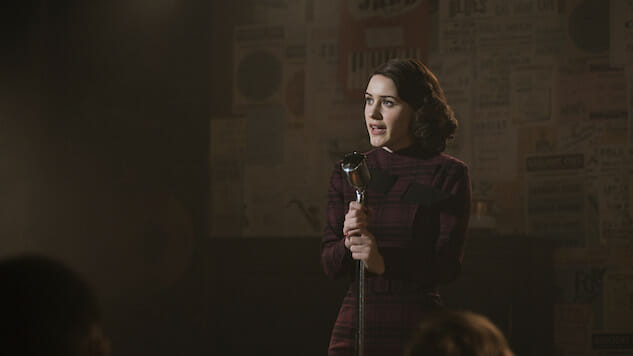Everybody Bombs: On the (Occasional) Brilliance of The Marvelous Mrs. Maisel
Photo: Amazon Prime Video
In the fourth episode of Amazon’s The Marvelous Mrs. Maisel, comedy scene veteran Susie Meyerson (Alex Borstein) invites aspiring stand-up Midge Maisel (Rachel Brosnahan, suitably marvelous) on a tour of New York’s clubs: an oddball ventriloquist, at a spot patrons refer to as “The Shithole”; a smooth operator at a swanky, “mainstream” establishment; Red Skelton at the Copa, seen through the kitchen door’s porthole window. The most important moment of the night, though—the one that explains why Amy Sherman-Palladino’s Eisenhower-era portrait of a comic pioneer falls short of its finest elements—comes at the end, as Susie and Midge chow down on burgers and fries at a dingy counter. The problem with Maisel, the middling drama, is that it’s at cross-purposes with Maisel, the sparkling comedy: The supporting characters are Midge’s material, not flesh-and-blood figures in their own right. As Susie says, dismissing Midge’s need to confide, “Both of our futures depend on you making jokes about your weird life.”
In stand-up, of course, this is exactly the point: to reduce the boiling liquid of one’s personal experience until it’s so perfectly concentrated it becomes universal. And boy, does Midge’s act sing. The pilot episode climaxes with her first public performance, which she delivers in an eggshell-blue slip and pink housecoat after her husband, Joel (Michael Zegen), leaves her—it’s as fantastical as a musical sequence, or perhaps a dream, down to the fact that it begins with Midge muttering to herself. As she (and the luminous Brosnahan) gain steam, Midge’s raw, fast-talking fury becomes a performance; she steers into the emotional skid and catches each laugh before it careens off the precipice. She’s a natural because her comedy is, and yet Sherman-Palladino’s direction—treating the act as a showstopper, separated from life by the glare of the spotlight—maintains the border, permeable though it may be. As comedy, and on the subject of comedy, The Marvelous Mrs. Maisel has the feeling of a star turn, at once vulnerable and self-aware. Unfortunately, Midge’s act—at cocktail parties, in court, giving the toast at her own wedding—is only a sliver of the whole, the rest of which appears flat by comparison. The series’ success turns out to be at the heart of its failure: It’s akin to a Hollywood musical that relies mostly on dialogue, or Bunheads without the backbone.
By this I mean that Maisel’s connective tissue isn’t strong enough to sustain the audience in between sets—most episodes function as the lounge singers and beatnik poets at the Gaslight do, filling time until Midge hits the stage. The series is no more interested in its heroine’s “weird life” than Susie is, which is to say it’s all fodder: As Paste’s Amy Amatangelo notes in her review, Midge’s children are at best an afterthought, at worst a plot hole (her infant daughter must’ve fallen into the lamb curry, because she’s AWOL by midseason); her parents (Tony Shalhoub and Marin Hinkle) are neurotics of the sort you might hear described in a Borscht Belt summer; Joel, a failed stand-up himself, is in the midst of the same midlife crisis that confronts half the men on television. As in Sherman-Palladino’s mannered (though often charming!) Gilmore Girls, the only figures in Maisel to approximate characters, not caricatures, are its two female protagonists, and to say even that is giving Susie (despite Borstein’s efforts) a pass. The series, as the title promises, belongs to Midge Maisel, trailing her from her Upper West Side apartment to her parents’ place, from the Gaslight to the Copa, from bursting onto the scene to clawing her way back. But it also lacks the courage of its convictions: Maisel yearns to be Brosnahan’s one-woman show, a mordantly funny eight-part monologue, then pads each hour with the sort of humor Midge herself calls “pedestrian.”
-

-

-

-

-

-

-

-

-

-

-

-

-

-

-

-

-

-

-

-

-

-

-

-

-

-

-

-

-

-

-

-

-

-

-

-

-

-

-

-








































